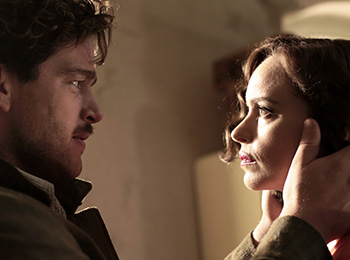German director Christian Petzold and actor Nina Hoss were still recovering from jetlag when they arrived at the Elgin Theatre in Toronto. They had flown in from Germany for the second night of the Toronto International Film Festival last fall. Even though they were dazed from the time shift, they were alert. It was the night of the world premiere of their latest collaboration, the postwar drama Phoenix.
Many of the thousand or so ticket buyers sat, hushed and mesmerized by the film, which opens theatrically in select Canadian cities on May 8. However, during the film’s climactic scene, Petzold and Hoss were taken aback by how many in the audience had started laughing.
“I was like, Oh my God. What’s happening?” Hoss tells The CJN the afternoon after Phoenix’s premiere. “I really had to think about [the laughter]. Did we do something wrong?”
The actor’s doubts soon vanished as the crowd gave the film a rapturous applause as the end credits rolled. The disorienting reaction to that big reveal, which this writer would hate to spoil, was appropriate for a film about lies and deception.
Phoenix tells the story of Nelly (played by Hoss), a survivor of Auschwitz. The war is over, but Nelly’s face is badly disfigured. After surgery gives her a new look, Nelly sets out to find her husband, Johnny (Ronald Zehrfeld). Nelly believes that he may have had sold her out to the Nazis. Underneath her new guise, she tries to find out the truth.
To prepare for this character that has just gone through intense trauma, Hoss says she chose not to speak with Holocaust survivors or read testimonies. She was worried that she didn’t want to go through such sensitive material.
Instead, she says she watched documentaries, including Claude Lanzmann’s Shoah, to immerse herself in the despair and darkness of war. One moment in that film, a barber talks with a bit too much volume and glee about how he cut people’s hair before they stepped into the gas chambers. Then, as he is working, his wife walks by.
“His voice is gone,” Hoss says of this unnerving moment. “[As an actor], I can take so much from looking at someone’s eyes, when you see this horror coming back and you’re not able to go over it with a loud voice.”
Reading books and watching documentaries was the key to getting her into the mindset of a woman trying to figure out a new, foreign world around her. Hoss says she did not read the novel Phoenix is loosely based on – Hubert Monteilhet’s Return from the Ashes – until after the film finished production.
Petzold originally read that book in German, after learning about it in the magazine Film Critic, mentioned in an article about the Alfred Hitchcock film Vertigo. At the time, he says he thought it would be impossible to make a film that combined Auschwitz and Hitchcock.
Just a few years ago, though, Petzold was reminded of this novel when he attended a screening at the Berlin International Film Festival, of documentary footage Hitchcock shot from Auschwitz. That film was infamously never released, as the director was so devastated by the material. (A new restored print with that footage is slowly finding an audience at film centres around the world.)
Petzold told The CJN that making such a film was necessary for him to deal with the “big historical cut” before and after the war. Due to the rise of Nazism, much of German culture, including art, music, film and fashion was lost, resulting in a hole between the generations.
“You make a period picture to research around this cut,” he says. “For someone in the cinema business in Germany, they ask, ‘Where are the comedies? Why don’t we have musicals or genres like film noir?’ It’s because we destroyed it.”
Accordingly, music is a very evocative aspect of Phoenix. In one scene, Nelly sings a song that connects her to her old life. Meanwhile, the nightclub in the film, which shares its name with the film ‘s title, shows a new German culture coming alive.
As part of the rehearsal process, Petzold took his cast and crew to the cinema where they could watch films featuring aspects of life that were absent from German culture.
One of those screenings was of The Young Girls of Rochefort, a French musical starring Gene Kelly and Catherine Deneuve. The film’s director, Jacques Demy, was Jewish and lost his parents during the war.
“[Demy] is living in a society where you can make musicals,” Petzold says. “We [Germans] cannot do that. This gap is our subject… our desire to dance.”
Alas, the desire to laugh as relief from a tense postwar story probably helps to close that gap too.
